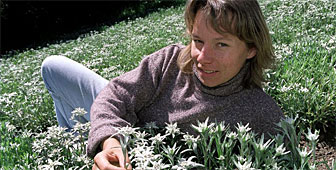Herbal remedy for embattled farmers

Boiled sweets and anti-wrinkle creams are enabling a growing number of farmers in canton Valais to keep their heads above water.
With prices for traditional products falling, some 130 farmers throughout the canton have joined the Valplantes cooperative, based in the village of Sembrancher, near Martigny. Its speciality is aromatic and medicinal plants.
By diversifying and growing thyme, camomile or mint, farming communities can supplement the dwindling income they get from traditional farming. Increasingly, sage and lemon balm are replacing potatoes and strawberries in many a mountain garden: they require less work and the rewards are greater.
“Thanks to these plants, families have been able to stay in their villages,” says Laurent Tornay, one of Valplantes’ biggest producers and its former manager.
“It is important for the protection of the mountain that Valplantes exists,” says the cooperative’s current boss, Nicole Debrunner. “It means these remote valleys remain habitable.”
Survival
She says that medicinal and aromatic plants often constitute 40 per cent of a producer’s income – for Tornay it is nearer 70 per cent: “Today, it would be difficult for them to survive without the plants.”
Valplantes was born in 1984. Tornay heard that the cantonal agricultural research station had been asked by the Swiss company, Ricola, if it could produce alpine plants for its herbal sweets and teas.
Tornay was smitten with the idea: “I went from door to door with a tin of Ricola sweets trying to persuade farmers to join me,” he told swissinfo. With a guaranteed buyer, 30 took the plunge. In that first year, they grew eight varieties on 2.5 hectares of land.
After those modest beginnings, Valplantes now grows 45 different varieties of aromatic herbs and flowers, producing 140 tons a year. As well as the Orange-Mint, the Mallow and the Lady’s Mantle, it is the only company in Switzerland that has succeeded in domesticating that elusive symbol of the Swiss mountains, the edelweiss.
There’s no longer any need to risk life and limb climbing rocks to find this “snow star”, as it is known in French. Some 50 Valplantes producers are growing it in neat rows in fields. They have begun attracting tourists, eager to see this rare beauty.
Wrinkles
Last year, the cooperative produced three tonnes of dried edelweiss. The vast majority is bought by the Basel-based pharmaceutical company Pentapharm, for use in anti-wrinkle treatment.
The plant has antioxidant properties, a result of its exposure to the strong ultra-violet light at altitude. This means it can counteract the free radicals in our bodies that speed up the ageing process.
It is also reputedly good for the digestion, and has been used for centuries in the Valais as a cure for diarrhoea.
The cultivation of edelweiss remains at an experimental stage, but Debrunner is convinced other companies will have followed Valplantes’ lead within a few years. “By then, we will have domesticated another plant – we have two or three in preparation.”
Valplantes has also succeeded in domesticating another beautiful mountain flower, known locally as the Génépi. A member of the Artemisia family, it is used in a popular local liqueur.
Although it may seem something of a disappointment to see these fragile alpine flowers being grown en masse in a field, their domestication will hopefully obviate the need for them to be picked in the wild.
Business booming
While Ricola remains the cooperative’s biggest customer, it, like its producers, has diversified – selling to the cosmetics industry and herbal tea producers, as well as producing its own product: Bio Alp Tea, a herbal ice-tea.
Business is booming. “Demand is growing all the time. The number of orders has exploded and we’re struggling to meet them. We’re always looking for more producers,” Debrunner says.
One of the attractions is that these plants are grown organically in the mountains – something that sells well abroad. Ricola says it is prepared to pay a little extra for the plants from the Valais in the name of quality.
“This is the ideal place to grow these plants,” says Tornay. “The Valais has a distinct advantage: we get a lot of bright sunlight. There is hardly any fog. That helps the process of photosynthesis.”
by Roy Probert

In compliance with the JTI standards
More: SWI swissinfo.ch certified by the Journalism Trust Initiative
You can find an overview of ongoing debates with our journalists here. Please join us!
If you want to start a conversation about a topic raised in this article or want to report factual errors, email us at english@swissinfo.ch.